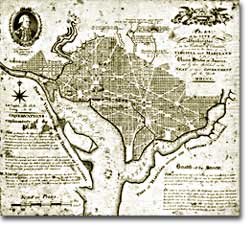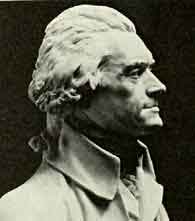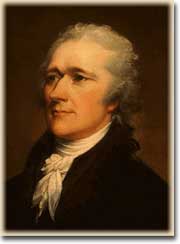18c. Growing Opposition

Thomas Jefferson supported the plan to build the young nation's capital along the Potomac River; Alexander Hamilton disagreed with the selected site. Hamilton finally agreed to the idea when Jefferson pledged support for some of Hamilton's financial reforms.
The 1790s brought extraordinary divisions to the forefront of American life and politics. Strong differences about how best to maintain the benefits of the Revolution lay at the center of these conflicts. Hamilton's economic policies were among the earliest sources of tension. They sparked strong reactions not only from elected officials and ordinary farmers, but even split Washington's cabinet.
Thomas Jefferson, who was the secretary of state at the time, thought Hamilton's plans for full payment of the public debt stood to benefit a "corrupt squadron of paper dealers." To Jefferson, speculation in paper certificates threatened the virtue of the new American Republic. Even Madison, who had worked closely with Hamilton in co-authoring The Federalist Papers, thought the public debt repayment plan gave too big a windfall to wealthy financiers.
As a counter-measure Madison proposed that Congress should set aside some money for the original owners of the debts who tended to be ordinary Americans and not new investors and speculators.
On a pragmatic level Madison's idea would have been difficult to implement. Nearly half the members of Congress invested in public securities. They stood to benefit financially from Hamilton's plan. Its passage was doubly assured.
Hamilton's successful bid to charter a national Bank of the United States also brought strong opposition from Jefferson. Their disagreement about the bank stemmed from sharply opposed interpretations of the Constitution. For Jefferson, such action was clearly beyond the powers granted to the federal government. In his "strict interpretation" of the Constitution, Jefferson pointed out that the tenth amendment required that all federal authority be expressly stated in the law. Nowhere did the Constitution allow for the federal government to create a bank.
Hamilton responded with a "loose interpretation" that allowed such federal action under a clause permitting Congress to make "all Laws which shall be necessary and proper."
Neither side was absolutely right. The Constitution needed interpretation. In this difference, however, we can see sharply contrasting visions for the future of the republic.

Thomas Jefferson opposed Alexander Hamilton's fiscal policies.
Opposition to Hamilton's financial policies spread beyond the cabinet. The legislature divided about whether or not to support the Bank of the United States. This split in Congress loomed as a potential threat to the union because northern representatives overwhelmingly voted favorably, while southerners were strongly opposed. The difference stemmed from significant economic differences between the sections. Large cities, merchants, and leading financiers were much more numerous in the north and stood to benefit from Hamilton's plans.
Keen observers began to fear that sharp sectional differences might soon threaten the union. Indeed, the Bank ultimately found support in Congress through a compromise that included a commitment to build the new federal capital on the banks of the Potomac River. In part this stemmed from the fact that southern states such as Virginia had already paid off their war debt and stood to gain nothing from a central bank. While most of the commercial beneficiaries of Hamilton's policies were concentrated in the urban northeast, the political capital of Washington, D.C. would stand in the more agricultural south. By dividing the centers of economic and political power many hoped to avoid a dangerous concentration of power in any one place or region.
The increasing discord of the early 1790s pointed toward an uncertain future. The Virginian Jefferson and the New Yorker Hamilton serve as useful figureheads for the opposing sides. While Hamilton was an adamant elitist whose policies favored merchants and financiers, Jefferson, though wealthy, favored policies aimed toward ordinary farmers.
Their differences also extended to the branch of government that each favored. Hamilton thought a strong executive and a judiciary protected from direct popular influence were essential to the health of the republic. By contrast, Jefferson put much greater faith in democracy and felt that the truest expression of republican principles would come through the legislature, which was elected directly by the people. Their differences would become even sharper as the decade wore on.







